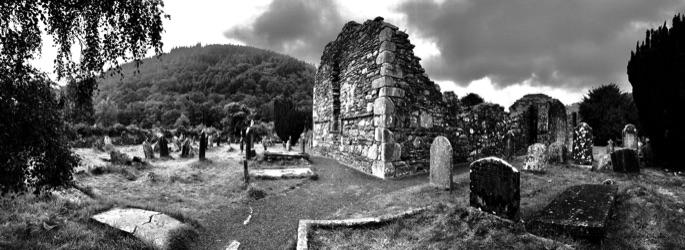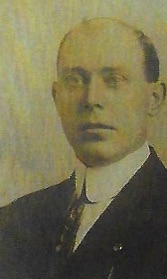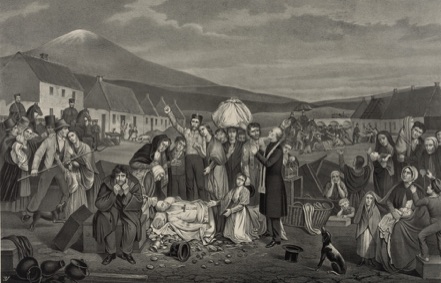Did I Inherit the Irish Obsession with Death and Misery?
By Nicole Borello

As my husband and I were paying our bill at the auto shop one day, the young gentleman behind the desk started telling us that he and his family were planning to go on a hike at Point Reyes National Seashore in Marin County. It had been a while since he and his family had been on an outing due to the pandemic. As soon as he said, “Point Reyes,” my mind drifted to when I was a kid, having seen and heard the horrific news about the “Trailside Killer.” I was terrorized so much by the news story that I never wanted to go there and enjoy the scenery. How could I? All I would do was think about the victims who had been murdered and tortured there. I said, “Oh, I never wanted to go there because of the serial killer that was up there.” The guy stopped typing on his computer. He looked at me with fear in his eyes. He said, “Serial killer?" Now that I had his attention, I could reveal all the hideous details. I assumed he didn't know about the murders because of his age, but I still wanted to share with him my morbid childhood memories.
My husband nudged me in the arm, “What the hell is the matter with you? The poor guy just wants to go on a hike with his family, and you're over here talking about murder and mayhem.” The guy quickly started searching the net for more info. “You're right,” he said. “I never knew that. Wow!” I wasn't trying to scare him. I just have a need to share macabre news. I can't help it.
Not only do I peruse through the obituaries like they are a gossip column, but when looking for someone I haven't spoken to in a long time, I look them up in the obituaries first to see if they are dead and then I proceed with my search. I'm always curious when I drive past funeral homes and see people walking in and out. I want to know, who died? And what was their story? At one point, I wanted to be a mortician.
Step into my office, and you are sure to hear a tale or two about someone passing away, a local ghost story, or the mysteries surrounding death. At the dinner table, I often talk about what the world will be like after I'm gone.
It's not that I sit around being depressed all day thinking about death. I tell death stories as if I'm talking about the weather. When I see people sleeping, I can't help but think that's what they'll look like when they're resting peacefully in a coffin— that is normal to me. I know, it's a sick way of thinking, but I've been that way since I was a kid.
My poetry always revolves around death and misery. Even if I haven't experienced the pain and misery myself, I like to relive it through my writing like some kind of literary masochist. I've been known to walk around cemeteries by myself with a notepad. One of my all-time favorite movies is the cult classic, “Night of the Living Dead.” I've been told that I always talk about death and depressing things. But where did I get this from?
Before I went to Ireland for the first time, I read a few articles that spoke of the Irish obsession with death. This caught my interest because I felt like I was reading about myself and how I was always digging a grave in my head. I wasn't born or raised in Ireland, so I don't consider myself Irish. I consider myself American, even though I carried an Irish last name most of my life (which I was sometimes bullied for believe it or not). My Irish side of the family were more recent immigrants in the scheme of things. They didn't come here three hundred or even two hundred years ago. They never came over because of the famine—for reasons unknown, they didn't abandon their land until the next century. They weren't here for the Civil War—they were fighting for their freedom on their own land. I am mixed with many things, as most Americans are, but Irish sticks out like a tormented thumb in my genetic breakdown. That fact being said, I believe that certain characteristics and traumas can be passed down from generation to generation, even if the bodies have moved to different parts of the world.
I worked hard to clear out those ancestral addictions and traumas. No matter how depressed I got, I swore I would never drink alcohol to ease the pain. Not to say, I don't enjoy an occasional beer or a glass of wine with my pasta, but to drink just to get drunk and drown my sorrows—nope. I never got to speak to my grandfather while he was sober. He spent a lot of time in pubs and getting into brawls. He took me to a St. Patrick's Day parade one year when I was a toddler, only to return home intoxicated, dropping me as he was trying to carry me in. I know that sounds like a stereotype, but in this case it was true. Not to say he wasn't a good guy, but this was probably something that was passed down to him from his parents, and his parents probably got it from their parents, and so on and so on. His grandfather survived the famine, so I can imagine what kind of traumas were passed down to his father and then to him. The misery just kept trickling down, and alcohol was the only way to survive it. So, I've never judged him for drinking.
I started connecting the dots while delving into my Irish ancestry. The Angel of Death was spreading his wings over my family long before I even made an entry into this world. My great-grandfather Patrick, who was from Ireland, worked at a cemetery, and then was buried in the same cemetery where he worked. He was working amongst the dead for a living, not knowing that eventually he would be joining his customers for an underground party.
My other great-grandfather James, who was from Scotland, but whose parents were from what is now Northern Ireland, worked for the city morgue picking up dead bodies. It's always been said that he was the very first ambulance driver in the city of Pittsburgh. Although I've yet to find any documentation of that specifically, documents do indicate that he worked for the city morgue as a driver.
My friend Lynne and I had gone to a haunted Pittsburgh tour one hot summer night. The tour guide was telling a story about an ambulance driver in 1916 who was driving one night and narrowly missed hitting a ragpicker on the Point Bridge. A few minutes later, he was summoned back to Mckees Rocks to pick up another body, only to realize it was the ragpicker who he had dodged on the bridge. The ragpicker had been hit by a train shortly after his narrow escape on the bridge. When the tour guide finished, I asked her, “Do you know who that ambulance driver was? Because my great-grandfather supposedly was the first ambulance driver here in Pittsburgh and he would have been driving in 1916.” She told me to email them and they would send me the newspaper article from 1916. They sent it to me, but there was no name mentioned of the ambulance driver, just that he had worked for the morgue. But there is a chance that could have been my great-grandfather. The eerie part is, almost forty years later after my great-grandfather had retired, he was walking across the street and was struck and killed by a truck. When I was talking to my dad about it, he said, “Wouldn't that be weird, if the guy who hit my grandfather was related to the ragpicker?” It's all a mystery and we may never know if that was my great-grandfather James or not. But he still picked up dead bodies for a living, which is more proof that working with the dead ran in my family.
My great-great-grandfather Thomas, also from Ireland, came to America later in life and died not too long after arriving. The details of his funeral implied that the family had brought over customs from the old country. The casket was removed from the home of his son after the wake by six pallbearers, and then accompanied by an extended procession to the church. There were singers, music and many in attendance who came to celebrate his life. One of the older, more beautiful traditions that I think should make a comeback, was keening. Keening is a centuries old practice in Ireland and Scotland (though practiced by other cultures as well), and comes from the Gaelic word, caoineadh which means “crying.” Experienced, older women paid respects to the deceased by wailing in a vocal artform, and by banging on the coffin and ground. It was said that by keening, it enabled the soul to leave the body. No words, but more repeated sounds. In the 1600's, the Roman Catholic church believed it was a pagan ritual, and opposed the practice. By the 1800's, it began fading out in Ireland. However, it was still practiced mostly in rural areas.
When visiting my father, we often drive past a mausoleum in town, and he lets me know every time we go by, that that is where he will be placed when he passes on. He has his obituary already written up and showed me. I like reading obituaries but not my father's, who is still alive and sitting next to me! That's even creepy for me. So, as I was reading articles about the Irish people's obsession with death, I had to laugh. I said to myself, this has got to be an Irish thing that crossed the Atlantic with my ancestors and never left our blood stream. Because no one does this on my mother's side.
Another thing that the Irish and Scottish immigrants brought over, was Halloween traditions—a mix of Christian and pre-Christian customs, that offended the Puritans so much, they prohibited these “pagan” celebrations. (How dare immigrants celebrate their own culture!) The Puritans believed it was of a satanic nature and refused to take part in it. Many people today still hold these same views. Originally celebrated as Samhain (pronounced sow-in), in Ireland and Scotland, it was to celebrate the ending of the harvest season and the beginning of what was to become winter. Bonfires were lit, and many ceremonies were performed to ward off evil spirits. It's said that it is a time that the veil between our world and the spirit world is very thin. But these celebrations, that involved dressing up as the dead to ward off malevolent spirits, carving scary faces into pumpkins (originally turnips), offering food to the deceased, honoring ancestors and guising, were brought here from Ireland and Scotland—and America didn't want to accept it at first. Eventually, the traditions were embraced and Halloween is now a billion-dollar business. It's a watered-down version of what the immigrants brought over, and has been greatly disconnected from the ancestors and the folk traditions.
When I was in Ireland, I made it a point every day to go on walks, to touch the trees, listen to nature and connect with the ancestors. I had been studying the Irish language on and off for a few years. It's very hard to maintain since I know about two people here in the States that I can practice with, and I don't see them very often. I'm all about keeping traditions. It's important to me to keep alive the native language of my ancestors. When my niece heard me speaking to an Irish priest in not-so-good Irish recently, she asked, “What language are you speaking?” I knew it was a rare and special language because she is a language teacher and speaks multiple languages and she didn't even recognize it. I was disappointed when I went to Ireland discovering that many native Irish did not speak their own language. I asked one guy how to pronounce something that was on a sign and he said, “I don't know. I was never any good at Irish in school.” As if it was a foreign language. I said, “But why? That's your native language.” He shrugged his shoulders and said, “I never had any use for it.”
After a long day in the Irish countryside, and hearing stories of the Irish Otherworld from a friend who came down from Northern Ireland to see me, I fell ill. I had a fever, chills, throbbing headache and I was fatigued beyond words. There wasn't any folk medicine around, so I had to crawl to a local convenient store to see if they carried anything that could cure my sudden illness. I felt like I was going to die. Did I absorb the energy from the land? Was I reliving the illnesses and the shapeless miseries of my ancestors? Was Ireland still an infected wound that needed healing and I tapped into it? Did I ask for it because I was trying to connect with the dead? Did I not ground myself and protect myself from the unknown? When we went to Italy, I felt healthy. As soon as we returned to Ireland, I became ill again.
Even with all the trauma that Ireland has gone through, it's somehow a beautiful poem wrapped in a haunted bow. Yet, it's rarely acknowledged. Their pain is told through music, poetry, artwork, dance and storytelling. I wasn't born on the Emerald Isle, but somewhere in my genes, I carry the Irish tradition of storytelling, the gift to gab, and mostly—the obsession with death. That may or may not be a healthy outlook on life, but I also have a sense of humor (like the Irish), that gets me through the darkness and helps me realize that death is never really the end.
Here are a couple of ancestral poems I wrote that deal with, what else? Death and Misery!
No Formal Burial
I dreamt the roses died.
The shape and odor
melted into a red ocean.
I dreamt I was gnawing on
a warm piece of bread.
A delusional delicacy
disappearing from my palms.
My dead branches poked
with drought and dusted with
barren earth, bleed thin twigs.
I dreamt I was awake, that within
the dream their bellies were full.
They were different versions of myself:
skinny, fed, bloated, in peasant bondage,
feverish, tenant in a tenant-landlord brawl.
I can't seem to escape the spiral of
my children's limbs. My milkless breasts
lead my children into misery.
…guigh orainn na peacaigh,
(pray for us sinners)
…anois, agus ar uair ár mbáis
(now and at the hour of our death)
And I dig the earth just to prepare.
**originally published by Thick With Conviction
Before They Were Tossed Corpses
They were translated like a sestina.
Riddles unrhymed and deep-rooted.
Their souls drifted between sorcery
and crucifixes. Veils slashed on their
own shores—sunrise to sunset.
Wounds of rose
Skin of stress
Souls of fracture
Hearts of vacancy
Hands of drought
Bodies of limestone
Maidens of iron
Wisdom of herbs
Hair of rhythm
Hair of twigs
Hair of snakes
Hair of crow
Eyes of woad
Eyes of mint
Eyes of chocolate
Eyes of the blackest olives
Yet, they weren't even considered human.

My great-grandfather James
who worked for the city morgue

Nicole Borello is an author, poet and founder and editor of Quaci Press

Everett Collection/Shutterstock